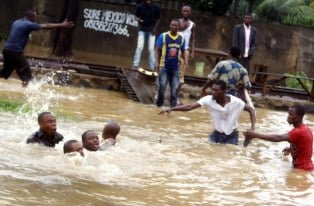The Federal Government has officially denied that the recent devastating floods in Mokwa, Niger State, were caused by a dam failure or water spillage from nearby reservoirs.
During a press briefing in Abuja on Tuesday, the Minister of Water Resources and Sanitation, Prof. Joseph Utsev, clarified that both the Kainji and Jebba dams remain fully operational and pose no threat to surrounding communities.
"It is important to say on record, the flooding in Mokwa was not a case of water spill from Kainji or Jebba dams. Both dams are intact and do not pose any threat to the communities around them," Prof. Utsev stated.
Climate Change and Poor Urban Planning Blamed
Instead, the Minister attributed the catastrophic flooding to extreme rainfall resulting from climate change, compounded by inadequate urban development planning. He explained that existing drainage systems were overwhelmed due to blockages from tributaries and unregulated construction activities.
"The rain was so much that the town flooded. The town has some urban drainage, but these were all affected because the drainage system was posing some problems with blockages from tributaries and uncontrolled building activities," he said.
Prof. Utsev noted that the Nigeria Hydrological Services Agency (NIHSA) had previously identified Mokwa as a flood-prone area, highlighting the need for improved drainage infrastructure, relocation of at-risk communities, stricter enforcement of land use regulations, and broader public education to mitigate future disasters.
Devastating Impact and Response Efforts
According to the National Emergency Management Agency (NEMA), the May 29 disaster claimed over 200 lives, with approximately 500 people still missing, 121 injured, and more than 3,000 displaced. The floods also destroyed at least 265 houses and damaged critical infrastructure including roads and bridges.
The Minister conveyed the Federal Government's condolences to those affected by the floods and commended the Niger State government, local authorities, and emergency responders for their swift action.
Technical teams from the Ministry, NIHSA, Upper Niger River Basin Development Authority (UNRBDA), and the National Water Resources Institute (NWRI) are currently conducting a comprehensive assessment in Mokwa.
President Bola Tinubu has pledged federal support and activated the National Emergency Response Centre to coordinate ongoing recovery efforts.
The Minister emphasized the need for collaborative climate resilience action, stating that "all parts of society—government, private sector, civil society and our communities—[must] come together to build safer and resilient environments."













